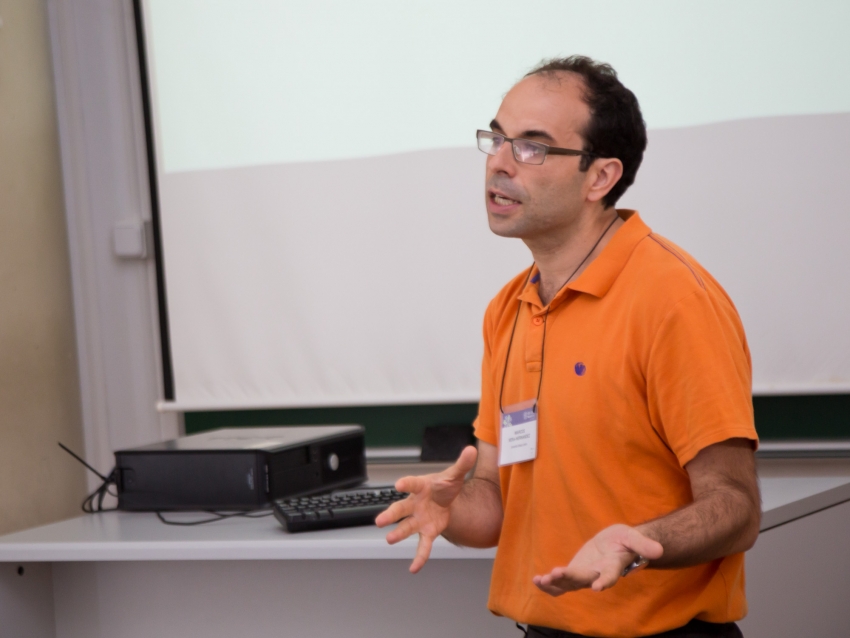Dec 2021
Tue 21 2021 @ 13:00. Webinar!!! Moved to Tuesday!!!! And Onsite also!!!!

Wed 1 2021 @ 13:00. Webinar!!! And Onsite also!!!!

- Speaker: Giacomo De Luca (Free University of Bozen-Bolzano)
- Title: Islamic Politics and Local Development: Evidence from Indonesia
- Invited by: M. Sartarelli (ICAE-UCM)
- Abstract: This paper investigates the role of Islamic parties' rule on local development in Indonesia. Using a regression discontinuity (RD) design, we compare districts in which the Islamic coalition barely won or lost in local elections. The analysis suggests that districts ruled by Islamic parties show a lower economic performance. Exploring the mechanisms, we find that Islamic local governments display a lower local revenues, partly due to their restrictions on locally-taxed specific entertainment activities, partly to lower transfers received from the central government.
|
 |
Nov 2021
Wed 24 2022 @ 13:00. Webinar!!! And Onsite also!!!!

Wed 17 2021 @ 13:00. Webinar!!! And Onsite also!!!!

- Speaker: Omar Rachedi (ESADE)
- Title: Carbon emissions over the life cycle (joint with Henrique S. Basso (Banco de España) y Richard Jaimes (Pontificia Universidad Javeriana))
- Invited by: L. Puch (ICAE-UCM)
|
 |
Wed 10 2021 @ 13:00. Webinar!!!

- Speaker: Luis Gautier (University of Texas at Tyler)
- Title: Environmental policy design for the olive oil sector
- Invited by: P. Alvárez (ICAE-UCM)
- Abstract: In the olive oil sector firms are increasingly transforming themselves into environmentally friendly firms. This transformation is marked by asymmetries in pollution intensities and high degrees of product differentiation. We study the role of this transformation in the design of environmental policy by comparing two environmental policy regimes: an emission tax and a relative binding standard. The analysis suggests that with sufficient asymmetry in pollution intensities an emission tax and relative binding standard are welfare-equivalent, but an emission tax is welfare-enhancing in the presence of sufficiently high degree of product differentiation. To make comparisons across policy regimes tractable, the welfare-maximizing policy within each regime is characterized as a function of the degree of product differentiation and pollution intensity. We characterize an equivalency scenario where policy adjustment is identical across regimes and hence show the existence of a degree of product differentiation where such equivalency holds. With these building blocks we argue that an emission tax is welfare-enhancing relative to the relative binding standard in industries where firms are becoming increasingly more environmentally friendly. We extend the analysis by incorporating uncertainty into our modelling strategy and show inter alia that an emission tax and the production of environmentally-friendly products are complements.
|
 |
Wed 3 2021 @ 13:00. Webinar!!!

- Speaker: Jo Seldeslachts (KU Leuven, U Amsterdam, DIW Berlin)
- Title: Common Ownership and Market Entry: Evidence from the Pharmaceutical Industry (with Newham, M. and Banal-Estañol, A.)
- Invited by: C. Rodríguez-Alvarez (ICAE-UCM)
- Abstract: Common ownership-where two firms are at least partially owned by the same investor-and its impact on product market outcomes has recently drawn a lot of attention from scholars and practitioners alike. Theoretical and empirical research suggests that common ownership can lead to higher prices. This paper focuses on implications for market entry. To estimate the effect of common ownership on entry decisions, we focus on the pharmaceutical industry. In particular, we consider the entry decisions of generic pharmaceutical firms into drug markets opened up by the end of regulatory protection in the US. We first provide a theoretical framework that shows that a higher level of common ownership between the brand firm (incumbent) and potential generic entrant reduces the generic's incentives to entry. We provide robust evidence for this prediction. The effect is large: a one-standard-deviation increase in common ownership decreases the probability of generic entry by 9-13%. We extend our basic theoretical framework and allow for multiple entrants. Our model shows that for sufficiently high levels of common ownership, the classical idea of entry decisions being strategic substitutes can be reversed into being strategic complements. Our empirical results provide some support for these predictions.
|
 |
Oct 2021
Wed 27 2021 @ 13:00. Webinar!!!

- Speaker: Ángel Marcos Vera-Hernández (University College London)
- Title: Monetary Incentives and Image Motivation: Evidence from a Large-Scale Experiment with Nigerian Midwives
- Invited by: C. Rodríguez-Alvarez (ICAE-UCM)
- Abstract: We test the relevance of image motivation in prosocial jobs through a large-scale experiment involving midwives deployed to needy areas. We randomize incentives to encourage midwife retention and measure midwives' image motivation, and social norms regarding length of service, using lab-in-the-field games. Our motivating behavioral model predicts incentives improve retention, changing the motivational composition of retained midwives by worsening the motivational signal of remaining. Our experimental findings show that incentives improve retention but may backfire as the most highly image-motivated midwives are more likely to leave earlier. Incentives also lengthen the minimum socially acceptable length of service.
|
 |
Thu 21 2021 @ 12:30. Panel Session*** Webinar!!! ... & Onsite

- Panel discussion: REGULATION OF THE ELECTRICITY MARKET IN SPAIN
- Organization: Teodosio Pérez Amaral (ICAE-UCM- Director ICAE)
|
|
Wed 20 2021 @ 13:00. Webinar!!! ... & Onsite

- Speaker: Alvaro Name-Correa (UCM3)
- Title: Multiple Prizes in Tournaments with Career Concerns (joint with Huseyin Yildirim, Duke)
- Invited by: C. Rodríguez-Alvarez (ICAE-UCM)
- Abstract: In a first period a designer selects the prize structure of a rank-order tournament in a setting where risk-neutral agents decide whether to participate or not. The score of a participant agent is determined by the sum of his (natural) talent, effort, and the noise term. Players besides caring about winning a prize, also have career concerns, and, as it is common in that literature, they do not know their talents. The market, however, learns about them through their performances. In a second period agents enter the (labor or talent) market regardless of their participation in the tournament. The market then makes each agent a wage offer equal to his inferred talent. We show that when agents are more patient or the variance of the error term is low, the tournament offered by the designer becomes less competitive (with more prizes) in order to induce participation. In the first case, career incentives are strong, in the second case, both career and tournament incentives are intense. Thus, given the market's expectation to perform, agents would be reluctant to enter the tournament, requiring the designer to announce a high number of (small) prizes. Furthermore, the optimal number of prizes is single peaked in the population variance of talent. This is because the most motivated agents in the tournament would be those who are moderately well-known by the market. Thus, given the market's expectation such agents would also be the most reluctant to enter in a competitive tournament. We also examine an alternative setting where only rankings are observed, and show that the designer offers a steeper prize schedule with fewer prizes with respect to the benchmark. This is due to career marginal incentives being less powerful in that case.
-
|
 |
Wed 13 2021 @ 13:00. Webinar ... & Onsite

Wed 06 2021 @ 13:00. Webinar!!!

Jun 2021
Wed 30 2021 @ 13:00. Webinar!!!

- Speaker: Juan Rodriguez Calvo (Phd. Candidate Quantitative Finance - Thomson Reuters)
- Title: Tres ensayos sobre selección de fondos de inversión y de fondos de fondos: viabilidad de ratios e influencia de comisiones
- Invited by: L. Robles (ICAE-UCM)
|
 |
Wed 23 2021 @ 13:00. Webinar!!!

- Speaker: Juan Jung (ICAE-UCM)
- Title: The impact of policies, regulation, and institutions on ICT sector performance
- Invited by: T. Perez-Amaral (ICAE-UCM)
- Abstract: This study uses econometric modelling to examine the impact of the regulatory and institutional frameworks on the performance of the ICT (Information Communication Technologies) sector and its contribution to the national economy as a whole. Its purpose is to provide policy-makers and regulators with the empirical evidence required to further regulatory reform in the ICT sector and address the challenges and gaps in current regulatory frameworks for digital services and applications. The study scope explores a set of critical questions: i) What is the impact of government policies and regulation on the performance of the ICT sector, as measured by capital investment, network deployment, service pricing, consumer demand, and ultimately impact on the economy? ii)Is competition enough of an incentive to drive an improvement of sector performance? iii) How long does it take for changes in regulation and policies to affect sector performance? The modelling is built on data from 145 countries between 2008 and 2019 – an up-to-date global data set, comprising 50 initiatives of policy reforms and institutional characteristics as well as 13 indicators of ICT sector performance.
|
 |
Wed 17 2021 @ 13:00. Webinar!!!

- Speaker: T. Perez-Amaral & A. Valarezo Unda (ICAE-UCM)
- Title: Online education in Spain 2008-2009. Drivers and impediments
- Invited by: C. Rodríguez-Alvarez (ICAE-UCM)
- Abstract: Online learning and training are gaining momentum worldwide by reducing the temporal and spatial limitations associated with the traditional form of face-to-face education. Online education improves access to education and training, especially during the present Covid-19 pandemic. This article focuses on online education adoption in Spain. A large and representative panel database from the ICT in the household´s survey by the National Institute of Statistics is used. The first objective is to provide an econometric model for the adoption of online education. Next is to measure the effects of relevant observable individual socioeconomic variables on adoption. A Heckman selection model using panel data for 2008-2019 allows estimating the impact of differences in gender, age, education, digital skills, habitat and income. The drivers and impediments have the expected signs and plausible sizes. The paper concludes with policy recommendations and suggestions for further research.
|
 |
Wed 9 2021 @ 13:00. Webinar!!!

- Speaker: Patrizia Pérez Asurmendi (ICAE-UCM)
- Title: The Choquet integral in the construction of composite indices: The case of the Sustainable Society Index
- Invited by: C. Rodríguez-Alvarez (ICAE-UCM)
- Abstract: In economic framework, composite indicators are a powerful tool to summarize the information provided by simple indicators in a unique value. Many of them are designed aggregating simple indicators through arithmetic and geometric means (sometimes the weighted ones) given their simplicity and their properties. But using these aggregation functions is subject to criticisms in the literature. In the case of the arithmetic mean, the main one focuses on the compensability that it allows among the different simple indicators that aggregates. To solve this weakness, the use of the geometric mean is highly recommended given that the compensability among the different simple indicators is lower than in the former. Nevertheless, the geometric mean exhibits also a relevant drawback, namely, it is not invariant to changes in the scale. To be more concrete, it is not stable when linear transformations are performed on the scale used to represent the values of the indicators. Accordingly, the final ranking depends dramatically on the selected scale of the simple indicators. Moreover, in both cases, the possible and common interactions among simple indicators are not considered in the composite indicator. To overcome these issues, we propose a model based on the Choquet integral. On the one hand, our proposal allows to consider the usual interactions among the simple indicators in the composite indicator when necessary. On the other hand, it allows to control the degree of compensability among simple indicators. Possible applications of our model are huge and to illustrate them, we also provide the implementation of our model in the Sustainable Society Index. Such composite indicator measures the level of sustainability of 154 countries taken into account the three dimensions of sustainability, namely, the Human Wellbeing, the Environmental Wellbeing, and the Economic Wellbeing dimension. Its complexity allows us to show the convenience of using our model in the construction of composite indicators
|
 |
Wed 2 2021 @ 13:00. Webinar!!!

- Speaker: Laura Garcia-Jorcano (UCLM)
- Title: : Forecasting the climate change risk by sea-level rises using time-varying extreme value analysis
- Invited by: L. Robles (ICAE-UCM)
- Abstract: One of the most significant potential impacts of climate change is the sea-level rise. A better understanding and measurement of extreme sea-level rise benefits the detection and attribution of climate change signals. Using the global and regional mean sea-level rise (mm) every 10 days (Dic/1992-Oct/2020), we propose two news forecasts measures called Extreme Sea-Level Value at Rise (ExSLVaR) and Extreme Sea-Level Expected Rise (ExSLER) at 10 days and at 1 month calculated for 8 seas/oceans of the Earth using Extreme Value Theory (EVT) and Filtered Historical Simulation (FHS) approach. Both measures enable us to calculate the dynamic risk of extreme sea-level rise in the coastal cities/countries of these oceans/seas. We also obtain time-varying mean sea-level rise projections for 10-80-280 years, reaching levels of 9.5 meters for 2300 for the Atlantic Ocean. Finally, we analyze the connection between our measures and financial risk in different sectors. The main evidence shows different regional and global forecasts. The results can serve as valuable inputs for these sectors in different cities/countries in deciding how much risk they are willing to accept, and consequently how much adaptation they need depending on the risk aversion of their decision-makers.
|
 |
May 2021
Wed 26 2021 @ 13:00. Webinar!!!

- Speaker: Lidia Sanchis-Marco (UCLM)
- Title: Spillover effects between commodity and stock markets: A SDSES approach
- Invited by: L. Robles (ICAE-UCM)
- Abstract: In this paper, we developed a state-dependent sensitivity expected shortfall (SDSES) approach using expectiles. This model enabled us to quantify the direction, size, and persistence of risk spillovers among the US and emerging market stock indices and different individual commodities as a function of the state of financial markets (tranquil, normal, and volatile). We obtained high and more significant spillovers and financialization process evidence in the volatile state after Lehman Brothers bankruptcy and market stock indices appeared to play a major role in the transmission of shocks to other markets.
|
 |
Tue 25 2021 @ 13:00. Webinar!!! Moved to Tuesday!!!!

- Speaker: C. Brum (B. de Uruguay, PhD. candidate UCM)
- Title: An indicator of monetary bias for emerging and dollarized economies: The case of Uruguay
- Invited by: A. Garcia-Hiernaux (ICAE-UCM)
- Abstract: The instability of the relationships between interest rates, amount of money, and exchange rate, and the transmission problems between different interest rates hinder the measurement of monetary policy through a single variable. This difficulty is particularly relevant in emerging and dollarized economies. This paper proposes a multivariate indicator of monetary bias for these economies in which the monetary and financial variables are considered according to the impact they have on inflation in each period. We analyze the case of Uruguay and use a Factor Augmented Vector AutoRegressive Moving Average model with eXogenous variables (FAVARMAX) to estimate these effects. Using the evolution of the indicator proposed, called the Monetary Conditions Index (MCI), we characterize the policy adopted by the Central Bank of Uruguay between 2010-2019, a period of inflation targeting
|
 |
Wed 19, 2021 @ 13:00. Webinar!!!

- Speaker: Agustín Casas (CUNEF)
- Title: Checks and balances and Nation Building: The Spanish Constitutional Court and the Support for Independence
- Invited by: M. Sartarelli (ICAE-UCM)
- Abstract: We examine whether judicial review can affect nation building by studying how the ruling of the Spanish Constitutional Court on the Catalan Constitution affected Catalan support of secession, which doubled in the 2010-2012 period. Our identification strategy relies on the fact that the ruling occurred amidst a public opinion survey. We find that the ruling led to a 20% increase in support for Catalan independence from Spain in 2010. In terms of mechanisms, we show that the ruling decreased identification with the Spanish national identity and trust in national institutions. We find that the ruling increased the intention to vote for Catalan nationalist parties and is associated with a long-lasting increase in electoral polarization in Catalonia.
|
 |
Wed 12, 2021 @ 13:00. Webinar!!!

- Speaker: Javier Ojea-Ferreiro (JRC-European Commission and ICAE)
- Title: Exchange rates and the global transmission of equity market shocks
- Invited by: J-A. Jimenez-Martin (ICAE-UCM)
- Abstract: We assess the role played by exchange rates in buffering or amplifying the propagation of shocks across international equity markets. Using copula functions we model the joint dependence between exchange rates and two global equity markets and, from a copula framework, we obtain the conditional expectation and measure the exchange rate contribution to shock propagation between those equity markets. Our estimates for emerging Latin American economies (Argentina, Brazil, Chile and Mexico) and two developed markets (Europe and the USA) document the following: (a) the contribution of exchange rates to the transmission of equity shocks is time varying and asymmetric and differs across countries; and (b) exchange rates diversify shocks from abroad for investors based in emerging economies (particularly Brazil, Chile and Mexico) and echo the effect of shocks from abroad for investors based in developed markets. This evidence has implications for international investors in terms of portfolio and risk management decisions.
|
 |
Wed 05, 2021 @ 13:00. Webinar!!!

- Speaker: Alejandro Buesa (BdE, PhD UCM)
- Title: Risky mortgages, credit shocks and cross-border spillovers
- Invited by: C. Rodríguez-Alvarez (ICAE-UCM)
- Abstract: This paper describes a novel methodology of measuring risky and conservative mortgage credit using household survey data for 18 European countries and the United Kingdom. In addition, we construct time series for both types of credit and embed them into a global vector autoregressive (GVAR) model, so as to study how shocks to both variables affect domestic output and propagate across countries through cross-border banking exposures. The results show that a decrease in risky credit can have long-lasting positive effects on GDP, both in the originating country and its most exposed peers, while a fall in conservative credit is detrimental. In some geographies, negative shocks to both types of credit reduce output, a feature linked to the lower relevance of homeownership which implies that mortgage credit plays a less prominent role in the domestic economy.
|
 |
Apr 2021
Wed 28, 2021 @ 13:00. Webinar!!!

- Speaker: Antonio Nicoló (Univ Padova)
- Title: A Commitment Theory of Populism
- Invited by: C. Rodríguez-Alvarez (ICAE-UCM)
- Abstract:
We propose a theory of populism as simplistic or unconditional commitment. Economic crises as well as social and cultural threats may be responsible for increased demand of simple credible policies, and reduced trust in the ability and reliability of representative politicians without policy commitments. We show under what conditions politicians choose to supply simplistic commitments in equilibrium and how this choice interacts with competence, antielite rhetoric and complementary fake news strategies. Whenever an equilibrium exists with one party choosing populist commitments and the other choosing delegation to experts, the former is always the one displaying lower moral universalism. Nationalism, closed border policies and protectionism are examples of commitment demands that reflect reduced moral universalism. When the desire for simple commitments increases, there can be also low political information when uncommitted politicians win.
|
 |
Tue 27 2021 @ 13:00. Webinar! Moved to Tuesday!!!!

- Speaker: Irene Ródenas Monedero (Phd -UCM)
- Title: Análisis de políticas de empleo en un entorno de modelos de búsqueda y crecimiento endógeno
- Invited by: J. Ruíz Andujar (ICAE-UCM)
|
|
Wed 21, 2021 @ 13:00. Webinar!!!

- Speaker: Alex Trew (Adam Smith Business School, University of Glasgow)
- Title: Fighting for Growth: Labor Scarcity and Technology Adoption during the British Industrial Revolution, (with Bruno Caprettini, UZH and Joachim Voth, UZH)
- Invited by: M. Sartarelli (ICAE-UCM)
- Abstract: Can labor scarcity accelerate technological adoption? We examine the effects of military recruitment during the Napoleonic Wars on the adoption of labor-saving technology in England, 1800-1850. Where the Royal Navy recruited more sailors, more machines that economized on (male) labor were adopted. Using depth of the seabed in front of coastal parishes, we show that exogenous shocks to labor scarcity led to technology adoption. This in turn led to both faster structural change as well as technological improvements through learning-by-doing effects.
|
 |
Wed 14, 2021 @ 13:00. Webinar!!!

- Speaker: Anett Erdmann (ESIC Business & Marketing School)
- Title: The long-run outcome of SEO keyword choice: Cost convergence and relative cost elasticity of website traffic.
- Invited by: E. Huergo (ICAE-UCM)
|
 |
Mar 2021
Wed 24, 2021 @ 13:00. Webinar!!!
- Speaker: M. Sartarelli (ICAE-UCM)
- Title: The Psychological Effect of a Math Signal
- Invited by: C. Rodríguez-Alvarez (ICAE-UCM)
- Abstract: This paper tests whether barely obtaining a pass score in at least one of two midterm tests has an effect on subsequent achievement in a Math course. To estimate the effect, we created a novel dataset by linking administrative and survey data on students at a medium size Spanish University and used a regression discontinuity design in which the cutoff is 5, i.e. the pass score in the national grading system. Although obtaining a score just equal to or barely greater than 5 in midterm tests has no immediate consequence for students, it may have a psychological effect by acting as a (de)motivating signal to study and pass the course, with the sign of the effect being unclear ex-ante. We find that obtaining a pass score in at least a midterm has a positive effect on the final exam score. The result can be rationalised by students’ ability to obtain a final exam score that when averaged along with the midterm tests scores leads to a pass score in the course, a proxy for rationality. Overall, our results suggest that partly unexplored psychological mechanisms may help us deepen our understanding of the determinants of achievement in Math.
|
 |
|
|
Wed 17, 2021 @ 13:00. Webinar!!!
Wed 10, 2021 @ 13:00. Webinar!!!
- Speaker: Judit Vall Castello (Universitat de Barcelona & Researcher at @FundacioIEB & at CRES-UPF)
- Title: Living at the peak: Health and public finance during the Covid-19 pandemic
- Invited by: M. Sartarelli (ICAE-UCM)
- Abstract: This paper provides novel evidence for the determinants of preferences for public health and the willingness to pay for health services using a survey experiment implemented during the third week of the lock-down in Spain (first wave) as well as during the last days of July (second wave). At the time of our experiment the confirmed COVID-19 cases reached the 100k mark in Spain and 1 million worldwide. We collect information on several health outcomes, which we are able to benchmark with results from previous surveys. Results show a substantial deterioration of mental health, which is more pronounced in groups of the population with less stable income sources and the younger group of individuals. Furthermore, we implement two information treatments about the fatality rate across age groups and the incidence rate across regions. In the first case, the treatment is stronger for those in, or with relatives in the risk group. The fact that regions are on different parts of the trajectory creates variation across regions in the second treatment. We ask participants about their preferred budget allocation, which we can again benchmark against the enacted budget and previous surveys. Results suggest that preferences for health care expenditures have almost doubled. Furthermore, we ask respondents about their willingness to pay for one out of three randomly assigned health care improvements. Contributions for more ICU beds are significantly higher compered to medical treatments and a vaccine
|
 |
Wed 3, 2021 @ 13:00. Webinar!!!
- Speaker: Warn Lekfuangfu (UC3M)
- Title: Raised by grandparents: the effects of growing up in skipped generation households on later-life educational attainment" (with Tanyamat Srungbunmee, Khonkaen University, Thailand)
- Invited by: M. Sartarelli (ICAE-UCM)
- Abstract: This paper explores the long-run effects of parental absence during multiple stages of childhood on later-life educational attainment. We look at the specific case of children in skipped generation families who grew up in households where grandparents are primary caregiver, and both parents were absent for an extended period. To deal with the endogeneity of family choices and parental migration, we exploit a plethora of fixed effect estimations (locality, birth cohort and sibling fixed effects) and instrumental variable design. Using a longitudinal household survey, the Townsend Thai Data, our estimates show that early childhood experience of growing up in skipped generation households harms schooling outcomes later in life. We provide evidence that grandparent-headed households with parental absence also spent less on children’s education despite having received higher remittances.
|
 |
|
|
Feb 2021
Wed 17, 2021 @ 13:00. Webinar!!!
- Speaker: Socorro Puy (U. de Málaga)
- Title: Constitutions, Federalism and National Integration
- Invited by: C. Rodríguez-Alvarez (ICAE-UCM)
- Abstract: A constitution defines a vertical and horizontal division of power. The vertical division is the power that regions transfer to the national government; the horizontal division is the relative power of each region in the national legislature. We explore what combinations of vertical and horizontal division of power arise when forming a nation or a union, and which combinations reduce the risk of dissolution. We present a new model of political bargaining among heterogeneous regions that design a common constitution. We show that scale economies translate into higher centralized systems, whereas cultural and political heterogeneity translate into more decentralized federal systems. Interestingly, the constitutions that minimize the risk of secession compensate with proportionally more power in the national legislature those regions that have less to gain economically from national integration. Such division of power contrast with other widely used that assign equal power to each region or power in proportion to population size. Our results suggest that compensations in the constitutional process need not be accomplished through direct transfers; it can be accomplished through the legislative process.
|
 |
Wed 3, 2021 @ 13:00. Webinar!!!
Jan 2021
Wed 27, 2021 @ 15:00. Webinar!!! Moved to 15:00!!
Wed 20, 2021 @ 13:00. Webinar!!!
|
|
 |
|
Gallery:
|
Wed 13, 2021 @ 13:00. Webinar!!!
|
|
 |
|
Gallery:
|






